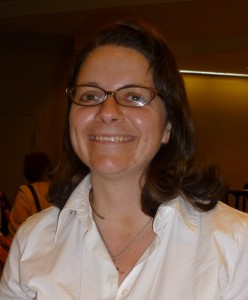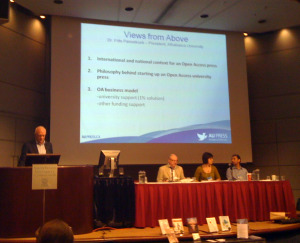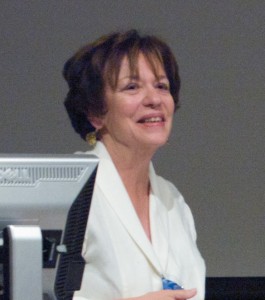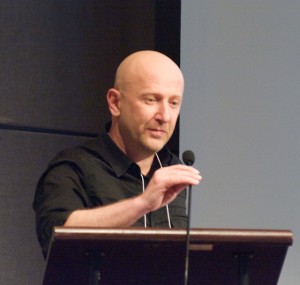Providing an Incentive: Developing Publishing Services for Researchers: The Session Blog
Presenter: Sara Fuchs, Digital Initiatives Library, Department of Scholarly Communication & Digital Services, Georgia Institute of Technology

Sara Fuchs
Time: 4-5pm, July 9th, 2009
Place: SFU Harbour Centre, Sauder Industries Room 2270
———————————————————————————————
Session Overview
Background
The Georgia Tech Library Department of Scholarly Communication & Digital Services set up an institutional repository in 2004 in hopes that faculty members could self-submit. Although they had always had a repository, it was usually set up after conferences had occurred. The department later decided to provide more support and began to help faculty create, store and view their papers, especially since nobody else on campus was offering similar services. The service provides both conference and journal support, as well as the uploading of any video recordings (of lectures as well), and digital archiving on the centralized repository for Georgia Tech authored materials, known as SMARTech. Submission onto SMARTech requires that the authors grant a non-exclusive license to Georgia Tech for non-commercial uses– mainly to raise awareness about open access to graduate students and supporting scholarly collaboration. SMARTech is now one of the largest institutional repositories in the United States and 35th in the world according to the Ranking Web of World Repositories, a project by the Spanish public research body Consejo Superior de Investigaciones Científicas (CSIC).
Lessons Learned with Open Conference Systems (OCS)
OCS works well for what it is supposed to do. It was a low pressure situation for the department because there was no need to maintain the OCS software, as everything was eventually going to end up in the repository. They found that clients enjoyed using OCS much more than the normal email workflow.
However, there were still challenges. With OCS, the process of accepting and rejecting proposals was more difficult– conference calls seemed to be much easier, and there is always a time lag in uploading presentations. Another challenge surfaced while setting up the Open Repositories 2009 Conference, mainly because they were working with two different websites. It made it very difficult to collect and retrieve conference papers. The Access Services Conference was the first time the payment function of OCS was used. Again, it was difficult to synchronize across two websites and this required going through multiple steps.
Customization
Clients wanted something more slick and streamlined, and wanted to use the more interactive parts of OCS, such as giving comments directly to authors, etc. In order to do this, all .css and template files had to be modified. New headers needed to be created, as well as modification of some menus, journal layout, and downloading of specific plug-ins. This proved to be very time-consuming, and this took design changes out of the hands of journal managers/editors. That being said, clients were highly satisfied and this became a showpiece of the department’s collaboration with faculty.
Questions
(Ran out of time)
Comment: Some of the difficulty in syncing between two websites might be easier if you upload/download directly from OCS instead of another location.
Related Links
July 13, 2009 Comments Off on Providing an Incentive: Developing Publishing Services for Researchers: The Session Blog
Being an Open Access Press – the First Two Years: The Session Blog

Photo by C Gratham at PKP 2009
Presenters:
- Dr. Frits Pannekoek – President, Athabasca University, Bio
- Walter Hildebrandt, Director, AU Press, Bio
- Kathy Killoh – Journals and Digital Coordinator, AU Press, Bio
- Shubhash Wasti – IT Systems Coordinator, AU Press, Bio
July 9, 2009, 11:30-am-12:30 pm. SFU Harbour Centre. Rm 1900
Background
Athabasca University’s scholarly press, AU Press, focusses on the dissemination of knowledge and research through open access digital journals and monographs and through new electronic media.
Session Overview
The presenters illustrated Athabasca University’s journey over the past two years since the creation of their open access scholarly press: AU Press.
Part I – Views from above (Dr. Frits Pannekoek)
Dr. Pannekoek opened the presentation by reminding the audience that AU is fundamentally dedicated to removing all the barriers to learning and that they support the range of “open” initiatives in education including open educational resources, open data, open source software, as well as the open access to scholarly work that is the primary work of AU Press.
1) International and National Context for Open Access
Dr. Pannekoek cautioned the audience that while they are advocates of open access, this view was not uniformly shared by all, as he was recently reminded while attending the World Conference on Higher Education in his role as president of the International Council on Open and Distance Education (ICDE). Consequently, Dr Pannekoek believes that “we’ve got a big fight on our hands”, and he listed the following issues as significant barriers to further support for open access:
- Support – the prevailing notion that digitized materials never have adequate level of support
- Quality – the common assumption that the best model for learning lies in the traditional craft model (one-on-one relationship between professor and student)
- Fraud – the fear of being plagiarised
- Imperialism – the view in some quarters that the open access movement is another form of imperialism because it is largely controlled by the North
Dr. Pannekoek also summarized how people are reacting to the open access movement. In particular, he noted that we will face increasing regulation of the flows of knowledge (e.g. through funding structures) as well as commercial publishers who change their economic models to include more services that have traditionally been regarded as the domain of the universities themselves.
2) Philosophy behind starting up an open access university press
Dr. Pannekoek says it comes down to the basic question of “What can we do with the resources we have?” Athabasca University spends upwards of 70% of their budget on academic salaries so they decided to use their resources to value what those people do and produce.
3) Open access business model
Athabasca introduced the “1% solution”. Here they identified 1% of the budget in each area and dedicated it to scholarly communication and publishing. While they do solicit support from other areas, Dr. Pannekoek stressed the importance of looking within our own institutions for funding structures.
Part II – Not Either Or (Walter Hildebrandt)
Mr. Hildebrandt focused on six of issues important to the AU Press. First, he brought up the ideological issues related to open access publishing. These include considering the commoditization, privatization, and corporate control of knowledge in light of the public right to access publicly funded research. Next, he recapped the barriers and issues upon starting the AU Press. Here he recapped creating a charter, mandate, vision statement and goals and reviewed their funding arrangement. He also spoke of the initial skepticism at Athabasca University about expected revenue and of potential negative impacts of royalties of print publications.
Mr. Hildebrandt reminded the audience that AU Press publishes not just print or digitally, but both, and that they focus on certain areas of specialization. Thus far, their publications include twenty books, six journals, one website, and numerous author interviews, and he very proudly pointed out AU Press’s four award winning books.
Next, Mr. Hildebrandt reviewed some of their authors’ responses to open access monograph publishing. The concerns focused on issues around royalties and copyright control. On the positive side, authors reported increased citations and were encouraged that SSHRC encourages open access dissemination. But ultimately, as Dr. Hildebrandt says, people would “rather be read than not read”.
Mr. Hildebrandt concluded his part of the presentation by touching on the future plans for the AU Press. By the year 2011 they plan to publish 30-35 books per year, more websites, more podcasts and videos , and to partner with other similar minded institutions.
Digital Publishing (Kathy Killoh)
Ms. Killoh focused on some of the details of AU Press publishing. First, she differentiated AU Press’s mandate of open access publishing from cutting edge e-publishing. For AU Press, open access publishing doesn’t mean all the “bells and whistles”. Instead, they focus on placing publications online, for free, in PDF format. They do see value added e-publishing (xml, epub, etc) as potential revenue opportunities in the future.
Ms Killoh also asked, “Is selling open access e-books an oxymoron?” For AU Press, apparently not. She reported that, even though all this material is available for free on the web, they still sell many books (e.g. to libraries) that are made available through searchable databases by vendors.
Ms. Killoh also described some details of the author contracts and copyright at AU Press. Upon legal advice that the term is to vague, AU Press contracts avoid the term “open access”. Instead, they use the creative commons licences and refer to the specific terms within those licenses. The copyright remains with the author, but the sign over licensing rights to AU Press. Royalties are negotiated individually for all contracts.
Finally, to conclude her portion of the presentation, Ms. Killoh took the audience on a tour of the AU Press website.
Part III – Hits and Sales – (Shubhash Wasti)
Mr. Wasti raised areas of further information that the AU Press needs to more thoroughly evaluate the success of their open access publishing. They would like to know details of the number of visits they are getting for each publication. Preliminary data shows that their does seem to be some correlation between the number of downloads and the number of sales, but that the ratio is not constant. In the sample presented, the ratio of downloads to sales varies from a low of 3:1 up as high as 65:1. Additionally, AU Press would like to track the sales of printed books and investigate the relationship between the number of downloads and the number of sales. While the print sales seem “reasonable”, they would like to the relationship to a number of factors (e.g. subject area, demographics, accessibility from type of device, etc)
Discussion and audience questions
- Terry Anderson’s book, The Theory and Practice of Online Learning , has become very well known in China, and this could account for very high downloads of that book.
- Question: How does the pricing of their print books compare to those of commercial publishers? Answer: They try to break even and to cover the cost of print because the cost of open access publishing is covered by the institutional support.
- Question: What are the financial issues around keeping content online for a long time? Answer: They appear to be the same as the IT infrastructure issues that all institutions face. They need both an increase in capital and in operating budgets.
Related Links
July 9, 2009 3 Comments
On Open Humanities Press: A Panel Presentation by Members of the OHP Steering Group: The Session Blog
July 9, 9:30AM – Fletcher Challenge Room 1900
Presenters
Barbara Cohen, Director of Humanitech, University of California, Irvine. Steering Group, The Open Humanities Press.
Gary Hall, Professor, Media and Performing Arts, Coventry University, UK. Co-founder of The Open Humanities Press.
Archived video stream of session
Background
Launched in May, 2008, The Open Humanities Press (OHP) is a scholar -led open access publishing initiative that currently publishes 10 journals. Central to OHP’s vision are goals articulated by the Budapest Open Access declaration (2002) to remove barriers to scholarly literature, accelerate research, enrich education and share the learning of the rich world with the poor.
Session Overview

Photo: J. Miller - PKP Conference
Barbara Cohen started the session with what she called “Open Access 101”, a quick survey of some basic principles and recent initiatives focused on ideas of giving free and open access to peer-reviewed scholarly literature on the Internet. This background is important context to consider in relation to the principles and goals driving The Open Humanities Press (OHP), an open access publishing house that launched in 2008 with 7 journals (now 10). Central to OHP’s vision are goals articulated by the Budapest Open Access declaration (2002) to remove barriers to scholarly literature, accelerate research, enrich education and share the learning of the rich world with the poor. Cohen went on to note that despite the fact that most scholars prefer to read electronic copies of articles, the Internet is still perceived by many Humanties scholars as being an unsuitable publishing medium for serious humanities research. In a 2008 talk at Irvine, Sigi Jӧttkandt, one of the co-founders of the OHP, characterized this perception where the Internet was seen as “a sort of open free-for-all of publishing” medium in stark contrast to trusted, peer-reviewed paper-based scholarly journals. The OHP was envisioned as a means to overcome this perception by bringing high-quality editorial standards and design processes to the field of Humanities scholarly publishing on the Internet. It was essential for the founders of the OHP that scholars felt that its journals would be good places to publish. The founders of the OHP feel that their stragegy of developing an open access publishing house has been a good way to gain the trust of the scholarly community in the humanities.
Cohen described OHP’s key goals as: advocating Open Access in the Humanities; fostering a community of prestigious Humanities scholars; promoting intellectual diversity, and exploring new forms of scholarly collaboration. A strong peer review model was seen to be key to the success of the OHP in developing a level of creditability and trust amongst Humanist scholars, and to that end, the OHP has gathered a prestigious, rotating editorial board, as well as a strong steering group, all without any operating budget. The OHP also has worked to bring open access content to its readers in journals that share high production values and effective leveraging of new technologies such as PKP’s Open Journals System and, in the future PKP’s Open Manuscript Press software.
Gary Hall

Photo: J. Miller - PKP Conference
The second speaker, Gary Hall, picked up the importance of open access initiatives with books and monographs. Such initiatives were particularly significant in the Humanities because scholars in these disciplines place such emphasis on books over journal articles. Hall discussed several book projects that are underway with The OHP, describing these efforts as focused upon a new cultural studies project, liquid books with a fluid structure up to the challenge of exploring the potential shape of the book to come. The first of these books has been published as New Cultural Studies: The Liquid Theory Reader. Hall was particularly interested in the potential of experimental projects that would allow scholars to challenge traditional concepts of the codex by expanding to include the range of materials/media found within printed books: excerpts, snippets of media, clips from multimodal texts. Such an exploration is an important response to the emerging landscape for digital texts, a landscape influenced by the proliferation of books scanned by Google and reading devices from ipods to Kindles.
Hall also indicated his interest in creative ways to employ open access and open editing strategies in liquid books that were free for anyone to read, write, remix, and reinvent to produce alternate parallel versions of books. Such acts of distributed writing and editing within liquid texts would, Hall hoped, raise critical challenges to traditional notions of authorship, intellectual property, authority, etc. This potential dismantling of the authority of the text was a particular challenge for open access initiatives, as they ran the risk of reinscribing and reproducing traditional approaches and limits of current knowledge production, this time in an electronic space. Drawing upon Derrida, Foucault and Barthes, Hall offered that open access could bring interrogations of academic authorship so as to loosen up these notions, making them less fixed and rigid (more jello-like). By recognizing some wobbles in the smooth surface of academic publishing, scholars would be in a good position to delineate and respond to shifts in power and authority increasingly evident in decentralized forms of writing such as MyTimes (a cross between the associated press and an RSS reader), Wikipedia (a networked, distributed and very liquid work), and other such fluid sites for knowledge production. Such a redistribution and decentring of traditional authority could help scholars to avoid replicating the current centre/periphery dynamics of knowledge production and dissemination, an imbalance that sees 90% of the world’s scientific research being published by just 15 countries.
Question Period
During the question period, one member of the audience identified a contradictory tension that seemed evident in the presentations offered in the session. On the one hand, the speakers stressed a need to establish the credibility of academic publishing. On the other hand, it was clear that there was also a keen interest in exploring the boundaries of new media (and traditional academic practice) so as to destabilize the model of academic publishing alongside the decentring of other concepts like authority (authorship), and the very form of scholarly writing be it journal articles or monographs. Keeping these things in balance is quite a challenge, especially when many scholars are as intent on building credibility in these new forms of academic scholarship at the same time as others are intent on destabilizing the very units and processes that have long characterized academic discourse. This somewhat anxious tension seems to describe aptly the stance of Humanist scholars exploring new cultural studies.
Related Links
The Open Humanities Press – Website for The Open Humanities Press, with links to their current journals: Cosmos and History, Culture Machine, Fast Capitalism, Fibreculture, Film-Philosophy, Image and Narrative, International Journal of Žižek Studies, Parrhesia, Postcolonial Text, Vectors.
Hall, G. (2008). Digitize This Book!: The Politics of New Media, or Why We Need Open Access Now (Minneapolis and London: University of Minnesota Press).
Jӧttkandt, S. (2008). Free Libre Scholarship: The Open Humanities Press. Irvine, 3 April, 2008.
Jӧttkandt, S. and Hall, G. (2007). Beyond Impact: OA in the Humanities. Brussels, 13 February, 2007.
King, J., Lynch, C, Willinsky, J. (2009) Open Access in the Humanities. Podcast. University of California, Irvine.
July 9, 2009 2 Comments